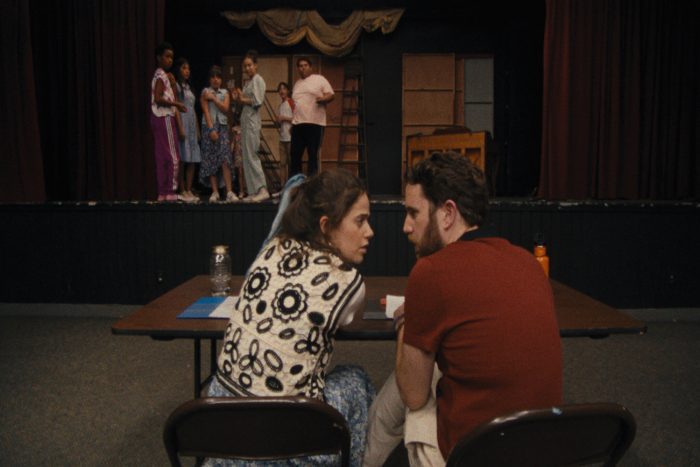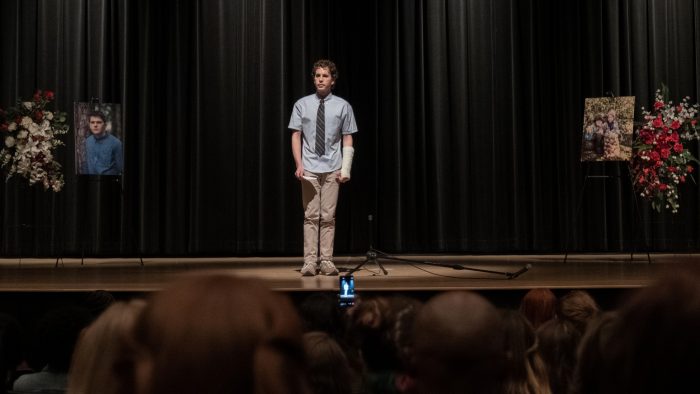Reviewed by Jeffrey Sanzel
While recruiting campers for her AdirondACTS camp, director Joan Rubinsky (Amy Sedaris) is sent into a seizure-induced coma by the strobe light in a middle school production of Bye Bye Birdie. Her slacker son, Troy (Jimmy Tatro), takes over the struggling enterprise, ineptly mismanaging its staff of well-meaning but mildly narcissistic misfits. In addition, he must deal with the camp’s failing finances and imminent foreclosure.
The simple and familiar premise—camp on the verge of closing—sets up a highly enjoyable niche outing, following in the footsteps of the slightly more satirical Camp (2003) and the equally intense Stage Door Manor documentary Stagedoor (2006).
Based on a short film of the same name, Molly Gordon, along with co-director Nick Lieberman, Ben Platt, and Noah Galvin, has fashioned the heartfelt mockumentary Theater Camp, which delivers consistent laughs but never lacks heart.
The film follows the four-week theatrical process, from auditions to opening. While mounting productions of Damn Yankees, Cats, and Crucible, Jr. (a hilarious joke to those familiar with the Jr. concept), the focus is on the annual original musical, written by the drama director, Amos Klobuchar (Platt), and the music director, Rebecca-Diane (Gordon). The project, Joy, Still (a bio-musical of the camp founder), takes up most of the film’s rehearsal and performance focus and manages to be simultaneously ridiculous and sincere.
Perhaps the mix of these tonal elements—ridiculous and sincere—best describes Theater Camp. While hurling barbs at theatre training and its many pretensions, it never loses its love for its subject. This truth is best reflected in the campers who shine in their own ways, displaying raw talent, fearlessness, and pure desire to perform. They represent a true demographic cross-section, bonded in the joy of all things theatrical.
The staff are an over-the-top crew but somehow make the caricatures believable. Platt and Gordon infuse the codependent pair with the dysfunction common to longtime theatrical collaborators who cannot communicate. Caroline Aaron plays the managing director with a mix of tough love and the awe of the non-artistic. Without losing the humanity, Nathan Lee Graham camps up the choreographer, Clive DeWitt, as does Owen Thiele as the costumer, Gigi Charbonier.
Ayo Edebiri makes the fraud, Janet, a charming grifter; her teaching of a mask class is one of the satirical highlights. Tatro’s lost Troy is likable, and his gradual awareness of the beauty of what his mother has created is genuine and touching. But it is Noah Galvin, as the jack-of-all-trades stage manager, Glenn, who provides the film’s biggest surprise. Galvin’s transformation at the climax is a revelation and a marvel.
Thematically, Theater Camp centers on being “one of us.” The staff and campers are cut from the same mold. They are the ones who are never picked first or second (or third or fourth) for teams. They are social outcasts in the outside world. But at AdirondACTS, they are not just accepted but celebrated.
Towards the end, the camp hosts a mixer with the neighboring camp, the privileged Lakeside. The Lakeside campers view the boisterous, outgoing theatre kids with not just disdain but the view that they are “other.” The film’s creators smartly refrain from giving the Lakeside campers commentary; the contempt is clear but unspoken. For all its problems—and they are myriad—AdirondACTS provides an outlet and a haven for these budding artists.
In the wake of artistic blockbusters (Barbie, Oppenheimer), Theater Camp is a lightweight diversion and an enjoyable slice of summer fun.
Rated PG-13, the film is now playing in local theaters.








